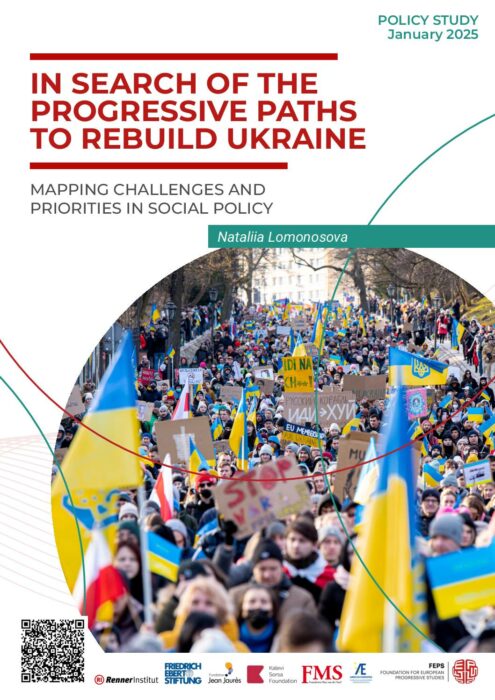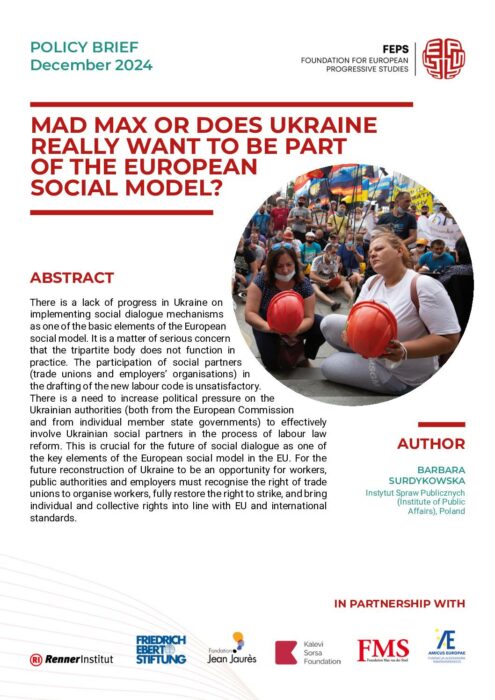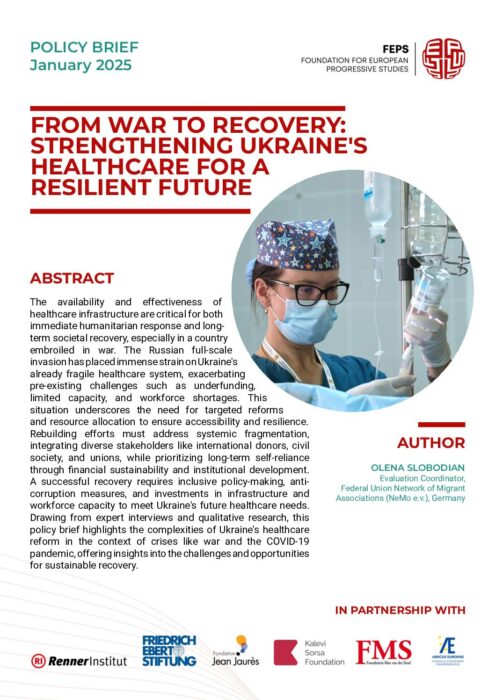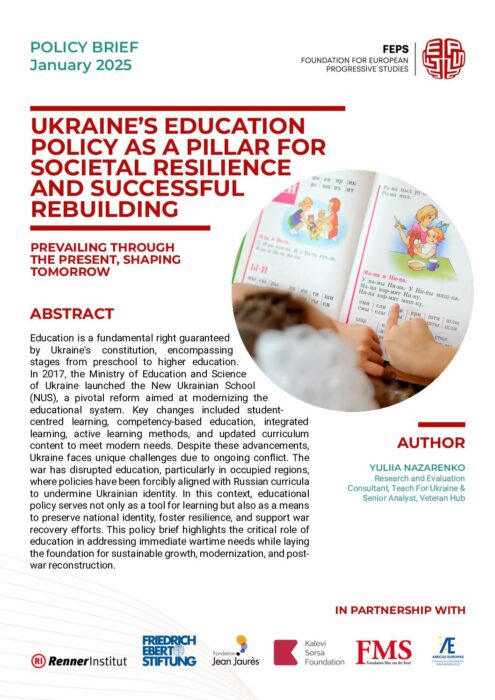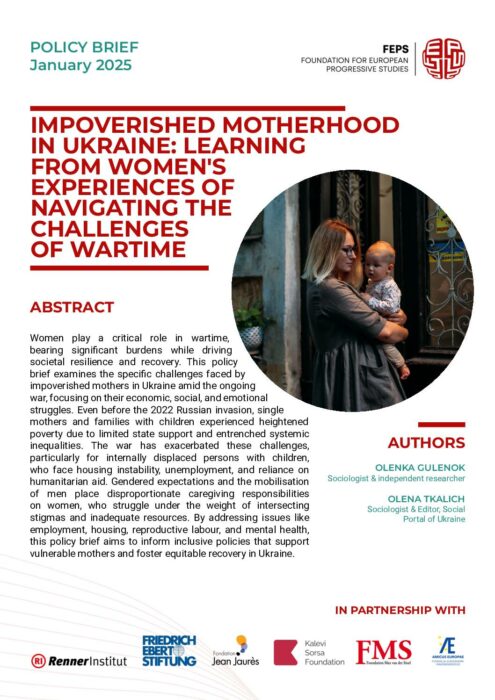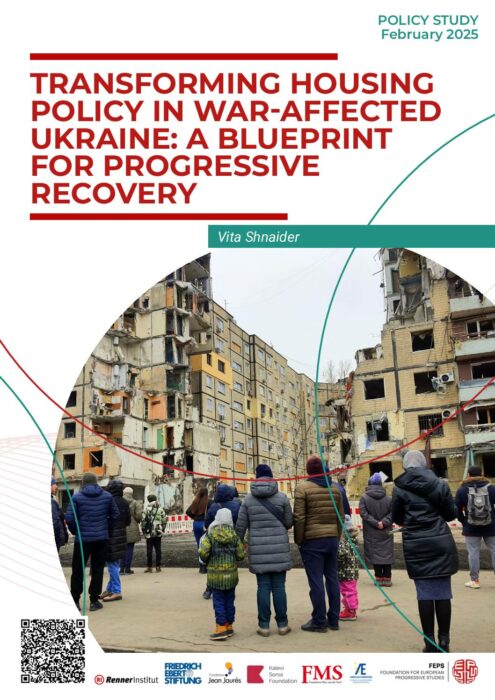Source: Getty Images
Today marks the third anniversary of the start of the war in Ukraine. In the context of the war that is still ongoing, Foundation Max van der Stoel has contributed to several studies in collaboration with Foundation for European Progressive Studies (FEPS) and its partners on the reconstruction of Ukraine. These six studies highlight different aspects of it, such as labour policy, healthcare and housing policy. To give an overview, the policy studies are briefly explained here.
Social policy challenges and priorities
In 2022, the Ukrainian government presented its first vision for post-war reconstruction, which was further refined at Recovery Conferences in London and Berlin in 2023 and 2024. This policy study analyses the emerging welfare model in Ukraine and highlights the opportunity to transform the economy and labour legislation in the context of post-war reconstruction. By examining recovery plans, recently adopted legislation and statements by government officials, the study assesses social policy developments and seeks to spark a broader public debate on the future of social policy in Ukraine. The study highlights the importance of focusing on social policy and offers important recommendations for a more equitable and sustainable recovery.
Social employment policy
Ukraine lacks progress in implementing social dialogue mechanisms, which are essential to the European social model. The functioning of the tripartite body, in which trade unions, employers' organisations and the government work together, is not effective in practice. The involvement of social partners in labour law reform is insufficient, raising concerns for the future of social dialogue in Ukraine. Urgent political pressure is needed, both from the European Commission and from member states, to better involve trade unions and employers' organisations in labour law reform. This is crucial for Ukraine's reconstruction and for ensuring labour rights according to European and international standards.
Sustainable healthcare
The Russian invasion of Ukraine has severely affected the country's healthcare system, further exacerbating already existing problems such as underfunding, capacity and staff shortages. This policy paper highlights the need for targeted reforms and strategic allocation of resources to improve the resilience and accessibility of the healthcare system. Rebuilding Ukraine's healthcare system requires a comprehensive approach that not only addresses short-term needs but also provides sustainable, long-term solutions. The paper examines the challenges of these reforms, with a specific focus on the role of international donors, civil society organisations and trade unions, and offers recommendations for a successful and resilient rebuilding of Ukraine's healthcare infrastructure.
The role of education
Education is an essential right under the Ukrainian constitution and plays a crucial role in the development of society. In 2017, Ukraine introduced the New Ukrainian School (NUS) reform to modernise the education system, focusing on learner-centred approaches and an up-to-date curriculum. However, with the ongoing war, many education systems are under pressure, especially in occupied territories, where Russian education policies are trying to undermine Ukrainian identity. This policy paper emphasises the importance of education, both in meeting immediate needs during the war and in laying the foundation for Ukraine's future, including post-war reconstruction and modernisation of the education system.
Support for motherhood
Women play a vital role in wartime, where they not only bear significant personal burdens but also contribute to the resilience and recovery of society. In Ukraine, mothers in poverty, and especially single mothers and families with children, face aggravated challenges due to war. Before the Russian invasion in 2022, they were already affected by poverty and limited government support, and the war has further worsened this situation, especially for internally displaced persons. Women also face disproportionate care responsibilities and struggle under the pressure of stigma and insufficient resources. This policy brief examines the economic, social and emotional struggles of these mothers and highlights the need for inclusive policies that support them in Ukraine's recovery process.
Transformation of housing policy
The Russian invasion of Ukraine in 2022 has exacerbated already existing problems in the Ukrainian housing sector and created new inequalities. The war resulted in significant damage to the housing stock, especially in the eastern part of the country, and caused a huge increase in the number of IDPs. Current housing legislation appears unable to respond quickly and effectively to the urgent needs of the affected population. This policy note highlights the urgency of a fundamental change in housing policy, with proposals for the creation of a National Housing Agency, housing finance reforms and legislative revisions to create a more sustainable and equitable housing supply for the Ukrainian population, especially for economically vulnerable groups.


